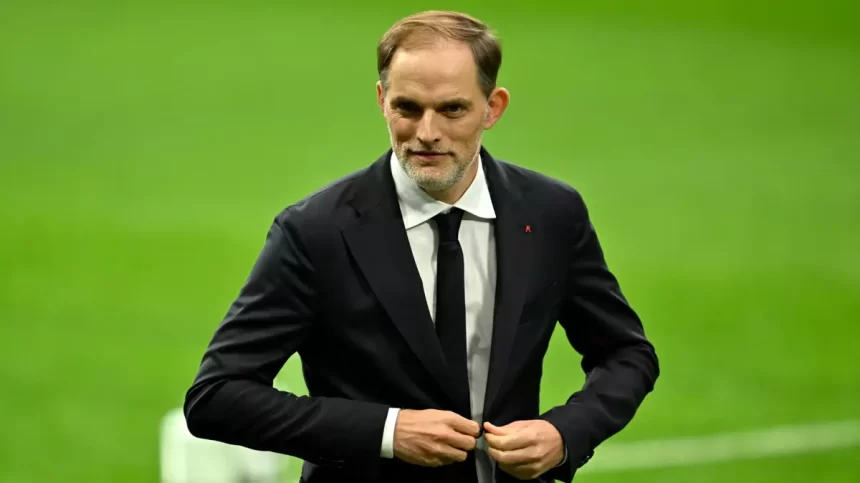As the new senior head coach of the England men’s football team, Thomas Tuchel has assumed one of the most intensely scrutinised managerial roles, not only in football, but in all of sport.
Commentary following his appointment suggests that he should expect unprecedented scrutiny. Despite superb credentials, including coaching Chelsea to Champions League victory in 2021, Tuchel’s appointment has raised anew the question of whether English players should be managed by an English manager.
At the press conference announcing his appointment, he apologised (only partly in jest) for holding a German passport. He is the first German to be appointed to the role. Sceptics have voiced concern about whether a “foreign” manager – particularly one from the England team’s fiercest rival – could feel the requisite passion, loyalty and determination for English success. But doubts about his commitment are only the beginning – the role of England manager involves an unenviable footballing dilemma.
The renowned American football coach Vince Lombardi made popular the sporting mantra: “Winning isn’t everything, it’s the only thing.” On the Lombardian view, performance has no value independent of its outcome. Set aside the mastery of skills, the lessons of winning and losing, forging bonds with teammates and opponents and the simple joy of play – for him, the value of sport lies in winning – and winning alone.
On this view, the clamour for Tuchel’s predecessor, Gareth Southgate, to depart following the 2024 UEFA European Football Championship was misguided. In reaching the final of successive European championships (2020 and 2024) and the semi-final of the World Cup in 2018, Southgate brought English men’s football to its greatest height since the World Cup-winning team of 1966.
His team comfortably outperformed the so-called “golden generation” of David Beckham, Stephen Gerrard, Frank Lampard and Wayne Rooney, which never progressed beyond the quarterfinals of a major tournament, playing for another foreign manager, Sven-Goran Ericksson. Judged by results alone, Southgate was a once in a generation England manager.
However, the English public subscribed to a more demanding philosophy of football: “Winning is essential, but it is not enough.” Despite the team’s success, the public wanted more. They demanded not only victory, but style too.
Southgate’s team played a conservative, defensively-minded brand of football. In Euro 2024, their passing wasn’t fluid and they created few chances on goal. Instead, they relied on a strong defence coupled with rare moments of attacking brilliance from individual players. Despite their success, Southgate became a lightning rod for criticism due to the uninspiring manner of his team’s victories.
A philosophical dilemma
The pursuit of victory in sport would seem, on the face of it, to be a simple proposition – play as well as you can and hope that this suffices to overcome your opponent. But playing to win is often less about playing well and more about ensuring that your opponent plays badly. It is less about executing your strengths and more about stifling the opposition.
In happy circumstances, playing well and playing to win coincide. In such cases, an opponent’s strengths and weaknesses can largely be ignored. Athletes who are comfortably superior to their opposition (think Serena Williams, Simone Biles, or the All Blacks in their pomp) may have the luxury of ignoring their opponents’ performance. Such is their dominance that, if they play well, victory inevitably follows. However, for mere mortals – including the Three Lions – even a good day can be a losing day.
This tension between playing well and playing to win is one that all athletes, of whatever level, must navigate. Tuchel now takes up the challenge of marrying these often opposed ideals – anything but victory is unacceptable and so too is anything but thrilling football.
In contrast to the Lombardian obsession with winning, sport can also be seen as a vehicle for self-expression. Each sport presents athletes with a unique set of obstacles, constraints embedded in the rules coupled with challenges presented by opponents. How we respond to those obstacles can express something about us, both to ourselves and to others.
Sporting competition can serve as a means of self-expression – a blank canvas on which athletes paint. We must decide how much we value sport as an avenue for proving athletic superiority and how much we value sport as an avenue to convey who we are and what we value. At its best, a national team’s style reflects a national footballing philosophy. But honouring our sporting identity may conflict with our desire to win.
Winning at the highest level and playing to express the pure form of our footballing philosophy may be mutually exclusive goals for all but the most dominant teams. Tuchel must grasp both horns of this dilemma while persuading the public of his desire for English success.
If the team’s results are anything but flawless, his commitment to the cause will be questioned. If the team’s style is unpleasing to the eye, he will be accused of misunderstanding England’s footballing identity. Who would envy him the task ahead?



